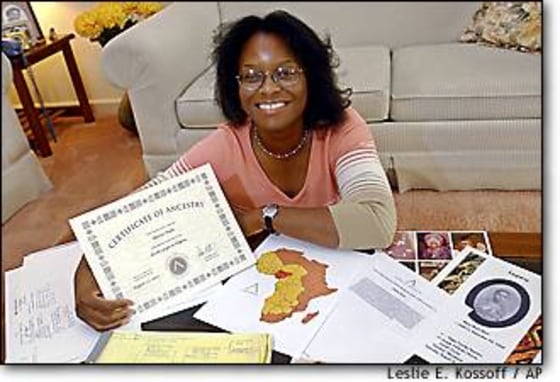Thirty years after Alex Haley’s “Roots” launched a genealogical renaissance, black Americans are exploiting the latest genetic research to make once-impossible connections to their ancestral homelands.
Blacks who search musty file rooms in government buildings, churches and cemeteries for family records have often been frustrated to discover their ancestral trails ended on this side of the Atlantic. Slave owners often changed the names of their captives, and poor record-keeping has prevented most from tracing their bloodlines to Africa.
Now, African Ancestry Inc., with its growing databank of African DNA samples, claims it can restore some of those lost connections, however faintly.
The small Washington-based company also is attracting the skepticism of some bioethicists who say its sales pitch raises unreasonable expectations.
Database of 10,000 people
African Ancestry offers two types of DNA tests and says it can usually trace at least one family bloodline to specific geographic areas on the African continent.
It has compiled a DNA database of 10,000 people representing 85 ethnic groups from Africa. Each of those groups have telltale genetic markers not found in other people. Those markers were passed on generationally and appear in African Americans’ cells today.
The company’s most common test tracks mitochondrial DNA, a strand of genetic material found outside the cell nucleus and apart from regular genes.
Evolutionary biologists believe each person’s mitochondrial DNA is a copy of their mother’s, their grandmother’s and so on — a maternal thread that reaches back to the dawn of the species.
This led to the theory that all humans descended from an African Eve — though that theory was tested a bit last year when Danish scientists documented a case in which a man’s muscle cells contained mitochondria descended from his father.
Because mitochondrial DNA mutates more rapidly than regular genes, scientists have been able to track the rate of such changes, making it possible to identify individual bloodlines.
Forensic specialists tasked with identifying corpses have turned to mitochondrial DNA for years, identifying some World Trade Center victims with such tests.
African Ancestry also tests DNA in Y-chromosomes, found only in males, theoretically documenting a person’s paternal bloodline. But only males can take the Y-chromosome test, whereas both sexes can submit to mitochondrial screening. It’s also more likely to show European ancestry because of “the dynamics of the plantation,” as company president Gina Paige delicately puts it.
African family trees
African Ancestry assembled its database by plucking genetic sequences of African tribes published in scientific literature and by collecting DNA samples from volunteers in Africa.
So with a swab of Monica Myles’ cheek and a $349 payment, the company was able to tell the family law attorney from Mitchellville, Md., that she was descended, in part, from the Ibo tribe — one of the largest ethnic groups in western Africa, where most slaves came from.
Assembling her family tree has been something of an obsession for Myles. She followed her ancestral paper trail to 1810, but ran into a dead end and couldn’t place any of her family on any of the estimated 30,000 slave voyages made between 1400 and 1860.
“It was frustrating not knowing where we came from,” said Myles, who still doesn’t have any detailed information before 1810.
But knowing that at least one of her ancestors was an Ibo adds an additional, albeit vague, limb to her family tree she couldn’t otherwise find.
‘Overselling the technology'?
Nonetheless, some professional genealogists and bioethicists are skeptical.
“What worries me most is people overselling the technology,” said Hank Greely, a Stanford University law professor and bioethicist. “I don’t think it can accurately give people the details they want.”
Greely said results showing just one-sixteenth of one’s heritage can be misleading. What if the other fifteen-sixteenths are completely different?
Still, company founders and others say the service they sell has profound benefits.
“People are going to connect with communities in Africa,” said Rick Kittles, a Howard University geneticist and a company co-founder. He said the service could encourage cultural exchanges, fostering closer ties between U.S. blacks and Africans.
African Ancestry has sold about 300 tests since launching in February. Meanwhile, companies serving other ethnic groups have also sprouted in recent months.
Trace Genetics of Davis, Calif., which has amassed about 4,000 DNA samples, offers to test for American Indian ancestry.
“DNA is going to be very important and it’s on the cutting edge,” said professional genealogist Tony Burroughs, who teaches at Chicago State University. “But it’s not a panacea. You’re not going to discover your entire family tree from a little spit on a cotton swab.”
Can't replace the paper chase
Burroughs, author of “Black Roots: A Beginners Guide to Tracing the African American Family Tree” argues that DNA can’t replace old-fashioned reporting work.
Instead, Burroughs said, genealogical breakthroughs will continue to come from uncovering previously forgotten written records. He’s after names, addresses and other hard facts that African Ancestry and other similar companies are unable to provide.
Besides, Burroughs said, nothing can replace genealogists’ excitement at making a tangible connection.
“I was in the National Archives and put my fingers on a discharge paper from 1815 of a relative who fought in the War of 1812,” Burroughs said. “What’s more exciting than that?”
